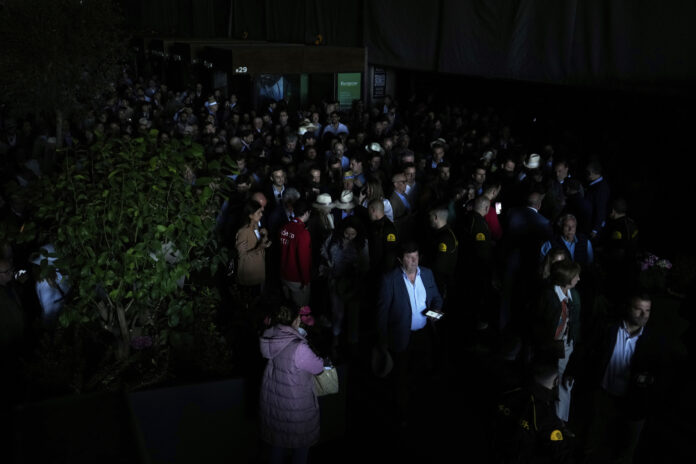
BARCELONA, Spain (AP) — A blackout brought much of Spain and Portugal to a standstill Monday, halting subway trains, cutting phone service and shutting down traffic lights and ATM machines for the 50 million people who live across the Iberian Peninsula.
Spanish power distributor Red Eléctrica said that restoring power to large parts of the country and neighboring Portugal could take 6-10 hours.
The company declined to speculate on the causes of the huge blackout. The Portuguese National Cybersecurity Center issued a statement saying there was no sign the outage was due to a cyberattack.
Eduardo Prieto, head of operations at Red Eléctrica, told journalists it was unprecedented, calling the event “exceptional and extraordinary.”
The outage hit across Spain and Portugal, including their capitals, Madrid and Lisbon. Offices closed and traffic was snarled as traffic lights stopped working. It was not possible to make calls on some mobile phone networks, though some apps were working.
The countries have a combined population of over 50 million people. It was not immediately clear how many were affected. It is rare to have such a widespread outage across the Iberian Peninsula.
Authorities said the cause was not immediately known, though one Portuguese official said the problem appeared to be with the electricity distribution network in Spain.
Spanish Prime Minister Pedro Sánchez convened an extraordinary meeting of Spain’s National Security Council and visited Red Eléctrica to follow efforts at restoring grid operations.
The Portuguese Cabinet convened an emergency meeting at the prime minister’s residence.
Portugal’s government said the outage appeared to stem from problems outside the country, an official told national news agency Lusa.
“It looks like it was a problem with the distribution network, apparently in Spain. It’s still being ascertained,” Cabinet Minister Leitão Amaro was quoted as saying.
Portuguese distributor E-Redes said the outage was due to “a problem with the European electricity system,” according to Portuguese newspaper Expresso. The company said it was compelled to cut power in specific areas to stabilize the network, according to Expresso.
Spain’s public broadcaster RTVE said a major power outage hit several regions of the country just after midday local time, leaving its newsroom, Spain’s parliament in Madrid and subway stations across the country in the dark.
A graph on Spain’s electricity network website showing demand across the country indicated a steep drop around 12:15 p.m. from 27,500MW to near 15,000MW.
Spanish airports were operating on backup electrical systems and some flights were delayed, according to Aena, the company that runs 56 airports in Spain including Madrid and Barcelona.
In Lisbon, terminals closed and throngs of tourists sat outside in the sun and the shade waiting for news about their flights.
“We haven’t seen any plane arriving or departing in the 50 minutes we’ve been waiting here,” Dutch tourist Marc Brandsma told The Associated Press.
Train services in both countries ground to a halt. Video aired on Spanish television showed people evacuating metro stations in Madrid and empty stations with trains stopped in Barcelona.
The Spanish Parliament in Madrid closed and play at the Madrid Open tennis tournament was suspended. Three matches were underway when power went down.
Spain’s traffic department asked citizens to avoid using their cars as much as possible due to the power outage, which has affected traffic lights and electrical road signage.
Barcelona’s streets filled with throngs of people on sidewalks, milling about in front of darkened stores and offices and exchanging information on what had happened.
Immediate concerns were which phone companies still had some, at least, spotty coverage, or where internet access might be found. Another concern was how to get home with the subway shut and public buses packed.
In Terrassa, an industrial town 50 kilometers (30 miles) from Barcelona, stores selling generators were out of stock after people lined up to buy them.
In Portugal, a country of some 10.6 million people, the outage hit Lisbon and surrounding areas, as well as northern and southern parts. Portuguese police placed more officers on duty to direct traffic and cope with increased requests for help, including from people trapped in elevators.
Portuguese hospitals and other emergency services switched to generators. Gas stations stopped working.
Portugal’s National Authority for Emergencies and Civil Protection said backup power systems were operating.
Several Lisbon subway cars were evacuated, reports said. Also in Portugal, courts stopped work and ATMs and electronic payment systems were affected.







